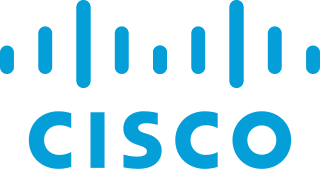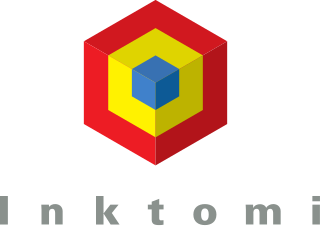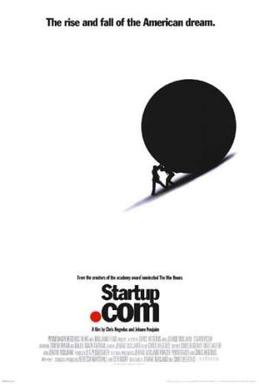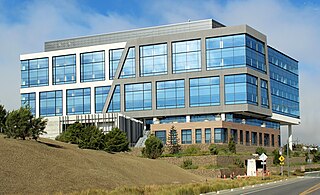
The dot-com bubble was a stock market bubble in the late 1990s. The period coincided with massive growth in Internet adoption, a proliferation of available venture capital, and the rapid growth of valuations in new dot-com startups.

Cisco Systems, Inc., commonly known as Cisco, is an American multinational digital communications technology conglomerate corporation headquartered in San Jose, California. Cisco develops, manufactures, and sells networking hardware, software, telecommunications equipment and other high-technology services and products. Cisco specializes in specific tech markets, such as the Internet of Things (IoT), domain security, videoconferencing, and energy management with leading products including Webex, OpenDNS, Jabber, Duo Security, and Jasper. Cisco is one of the largest technology companies in the world, ranking 82nd on the Fortune 100 with over $51 billion in revenue and nearly 83,300 employees.

Inktomi Corporation was a company that provided software for Internet service providers (ISPs). It was incorporated in Delaware and headquartered in Foster City, California, United States. Customers included Microsoft, HotBot, Amazon.com, eBay, and Walmart.

Webvan was a dot-com company and grocery business that filed for bankruptcy in 2001 after 3 years of operation. It was headquartered in Foster City, California, United States. It delivered products to customers' homes within a 30-minute window of their choosing. At its peak, it offered service in ten US areas: the San Francisco Bay Area; Dallas; Sacramento; San Diego; Los Angeles; Orange County, California; Chicago; Seattle; Portland, Oregon; and Atlanta, Georgia. The company had hoped to expand to 26 cities by 2001.

Boo.com was a short-lived British eCommerce business, founded in 1998 by Swedes Ernst Malmsten, Kajsa Leander and Patrik Hedelin, who were regarded as sophisticated Internet entrepreneurs in Europe by the investors because they had created an online bookstore named Bokus.com, the third largest book e-retailer, before founding boo.com.

Startup.com is a 2001 American documentary film directed by Jehane Noujaim and Chris Hegedus. D. A. Pennebaker served as a producer on the film. It follows the dot-com start-up govWorks.com, which raised $60 million in funding from Hearst Interactive Media, KKR, the New York Investment Fund, and Sapient.
Chemdex Corporation, later known as Ventro Corporation and then NexPrise, Inc., was a B2B e-commerce company that first operated an online marketplace for products related to the life sciences industry such as laboratory chemicals, enzymes, and equipment, but later expanded into a few other industries. It was notable for its $7 billion market capitalization during the dot-com bubble despite minimal revenues.

webMethods was an enterprise software company focused on application integration, business process integration and B2B partner integration. Founded in 1996, the company sold systems for organizations to use web services to connect software applications over the Internet. In 2000, the company stock shares rose over 500% the first day it was publicly traded. In 2007 webMethods was acquired by Software AG for $546 million and was made a subsidiary. By 2010 the webMethods division accounted for almost half of the parent company's revenues. Software AG retained the webMethods name, and uses it as a brand to identify a software suite encompassing process improvement, service-oriented architecture (SOA), IT modernization and business and partner integration.

PointCast was a dot-com company founded in 1992 by Christopher R. Hassett in Sunnyvale, California.
A dot-com company, or simply a dot-com, is a company that conducts most of its businesses on the Internet, usually through a website on the World Wide Web that uses the popular top-level domain ".com". As of 2021, .com is by far the most used TLD, with almost half of all registrations.

Vignette Corporation was a company that offered a suite of content management, web portal, collaboration, document management, and records management software. Targeted at the enterprise market, Vignette offered products under the name StoryServer that allowed non-technical users to create, edit and track content through workflows and publish it on the web. It provided integration for enterprise resource planning, customer relationship management and legacy systems, supporting Java EE and Microsoft.NET. Vignette's integrated development environment and application programming interface offered an alternative to conventional Common Gateway Interface/vi/Perl web development. StoryServer was used on many large websites including those of CNET, UnitedHealth Group, The Walt Disney Company, Wachovia, Martha Stewart, Fox News, National Geographic Channel, Pharmacia & Upjohn, MetLife, BSkyB, the 2004 Summer Olympics, and NASA.

Silicon Wadi is a region in Israel that serves as one of the global centres for advanced technology. It spans the Israeli coastal plain, and is cited as among the reasons why the country has become known as the world's "start-up nation". The highest concentrations of high-tech industry in the region can be found around Tel Aviv, including small clusters around the cities of Raʽanana, Petah Tikva, Herzliya, Netanya, Rehovot, and Ness Ziona. Additional clusters of high-tech industry can be found in Haifa and Caesarea. More recent high-tech establishments have been raised in cities such as Jerusalem and Beersheba, in towns such as Yokneam Illit, and in Airport City.
Onvia, Inc. is an American government business intelligence company with 180 employees and annual revenue of US $21.1 million. Onvia offers a number of business-to-business software products, including Onvia Business Builder, a government leads and relationship manager; Onvia Navigator, a database of government contracts; and the Onvia Guide, which provides push notifications of government business opportunities.

Epicentric, Inc., was an enterprise software company and a provider of enterprise portal solutions for Global 2000 companies. Made popular by custom portal sites like My Yahoo!, enterprise portals enabled businesses to deliver integrated Web services to their customers (Internet), partners (Extranet) and employees (Intranet). The company was founded in 1998 by Wired.com executive Ed Anuff and TouchWave executive Oliver Muoto, both startup veterans, in San Francisco, California. The company had over 300 employees and 350 Global 2000 customers before it was acquired by Vignette (VIGN) in December 2002.
Stockpoint was a provider since 1995 of online financial information through its websites InvestorsEdge.com and Stockpoint.com. The company also supplied SaaS capabilities which powered market data features for over 200 other websites such as Barclays Global Investors, Piper Jaffray, Quick & Reilly, the San Francisco Chronicle and Wired News.
Kaleil Isaza Tuzman is a former entrepreneur associated with digital media, who spent more than 20 years in that industry before being convicted of multiple counts of fraud in 2017. Tuzman started his career at Goldman Sachs, was co-founder of GovWorks.com, served as President of JumpTV, and then as chief executive officer and chairman of KIT Digital, Inc. On September 7, 2015, he was arrested in Colombia and held in a Bogotá prison until being extradited to the United States to face charges of fraud and market manipulation in connection with the defrauding of investors in KIT Digital and two investment funds. He was convicted on all counts in December 2017.

Actua Corporation was a venture capital firm. During the dot com bubble, the company had a market capitalization of over $50 billion. The company was originally known as Internet Capital Group, Inc. and changed its name to Actua Corporation in September 2014. In 2018, the company underwent liquidation.
Tradex Technologies Inc. was a developer of Java-based B2B e-commerce software. It primarily operated in the industries of financial services, telecommunications, plastics, and foodservice. It offered a platform for vertical trading hubs, another for large enterprises, and a third for the distributor channel segment. The software used JavaBeans technology.

Stripe, Inc. is an Irish-American multinational financial services and software as a service (SaaS) company dual-headquartered in South San Francisco, California, United States and Dublin, Ireland. The company primarily offers payment-processing software and application programming interfaces for e-commerce websites and mobile applications.












